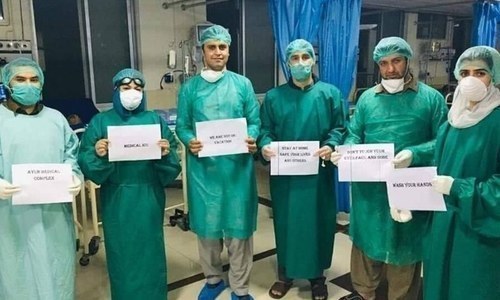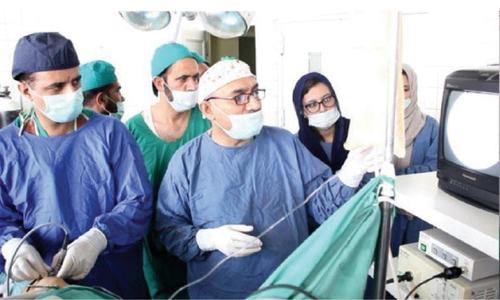PESHAWAR: The implementation of new guidelines about managing dead bodies of suspected or confirmed Covid-19 patients ended the fear that bodies of the people dying of the pandemic can spread the infection.
“To date there is no evidence of persons having become infected due to exposure to the bodies of persons, who died of Covid-19,” say the guidelines issued by World Health Organisation.
A month ago, health department notified the new standard operating procedures according to which after death of a coronavirus patient and disinfection of the deceased, the body can be buried like a normal one.
Prior to this, the administrators of the hospitals used to face quarrels with the relatives of the dead persons as the latter wanted the bodies to be buried in accordance with the religious rituals while the former would insist on the observance of SOPs.
The old SOPs made it binding upon the health staffers to give bath to the dead persons at the hospitals and seal them in the coffin before shifting them to their native graveyard for burial.
SOPs allow normal funeral for coronavirus victim after disinfection
Only five people were allowed to perform their funeral keeping in view the social distancing measures of standing six feet apart.
“We used to face wrath of the relatives of the dead persons who wanted to give bath, perform funeral and bury their near and dear ones but the burial guidelines didn’t allow it,” a doctor at one of the Peshawar-based hospitals said.
He said that they had to inform the district administration of Peshawar and the administration of district to which the bodies were supposed to be transported along with relevant district health officers to send the body in the presence of police for burial in their ancestral villages.
“Many times, we indulged into physical bouts with relatives but now the situation has improved,” said the doctor.
The new guidelines say that family and friends may view the body after it has been prepared for burial in accordance with customs but they should not touch or kiss the body and should wash hands thoroughly with soap and water after the viewing.
It says that all the people attending the funeral prayer should wear a mask and family member or friend, who is unwell, should not attend the funeral prayers. Safe distancing should be maintained throughout the procession, funeral prayers and burial.
Those tasked with placing the body in the grave etc should wear gloves and wash hands with soap and water after removal of the gloves once the burial completes.
The guidelines say that Covid-19 is an acute respiratory illness caused by virus that predominantly affects the lungs and based on current evidence this virus is transmitted between people through droplets, fomites and close contact with possible spread through faeces.
Before attending to a body (whether at home or hospital), people should ensure that necessary hand hygiene and personal protective equipment (PPE) supplies
are available including face shields and infection prevention protocols are followed. Elderly and immune suppressed persons should not directly interact with the body.
The dignity of the dead, their cultural and religious traditions, and their families should be respected and protected throughout the process.
No special transport equipment or vehicle is required for the purpose.
If the family members wish only to view the body and not touch it, they may do so, using standard precautions at all times including hand hygiene. Give the family clear instructions not to touch or kiss the body, says the guidelines.
In case a sample report of a Covid-19 test is awaited, there is no need to hold the body as SOPs are the same for both confirmed and suspected cases.
Human coronaviruses can remain infectious on surfaces for up to nine days. Covid-19 virus has been detected after up to 72 hours in experimental conditions. Therefore, cleaning the environment is paramount.
Published in Dawn, July 13th, 2020














































Dear visitor, the comments section is undergoing an overhaul and will return soon.